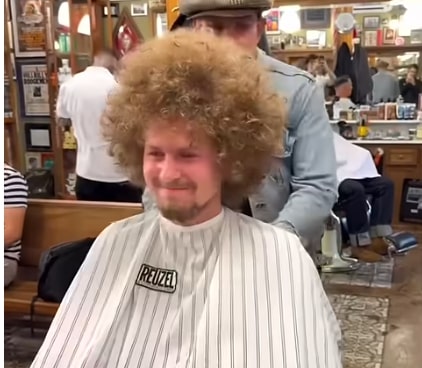The brass bell above the door gave a cheerful jingle as it opened, releasing a rush of cold Rotterdam air into the shop.
Schorem wasn’t just any barbershop—it was a temple.
The walls were lined with vintage mirrors and posters of greased pompadours, the faint scent of Bay Rum cologne and tobacco smoke hanging in the air like nostalgia itself.
When the man walked in, heads turned.
His hair was a spectacle—thick, wild curls that cascaded past his shoulders like a lion’s mane. The kind of hair that looked untamable, unplanned, almost alive.
The barbers exchanged curious glances. Schorem was used to bold transformations, but this… this was different.
“Welkom,” said Pascal, one of the senior barbers, his voice calm but firm. “You’re a brave man walking in with that forest. What’ll it be?”
The man smiled faintly. “Something clean. Sharp. But… keep the soul.”
Pascal chuckled. “At Schorem, we don’t cut souls. We shape them.”
The Transformation Begins
The man sat down in the old leather chair, the brass footrest gleaming under the lights.
As the white cape was fastened around his neck, the sound of scissors snipping from nearby chairs created a rhythmic symphony. The barbers worked like painters—each cut deliberate, precise.
Pascal ran his fingers through the client’s curls. “What do you do, friend?”
The man hesitated. “I… used to work with restoration. Old buildings. Churches. Things built to last.”
“Good trade,” Pascal nodded, lifting a section of hair. “You’ve got an artist’s hands.”
The man’s eyes flicked to the mirror. “Not anymore.”
For a moment, something cold passed between them. Pascal didn’t ask again.
He began cutting, shaping, and the curls fell in thick coils onto the floor—each strand hitting the black-and-white tiles like pieces of the past being shed.
But as the layers disappeared, the shop grew quieter.
The air felt heavier.
The Unease
Across the room, one of the apprentices—young Willem—paused mid-shave. He leaned toward another barber. “Boss, you feel that?”
Pascal frowned. “Feel what?”
“The lights,” Willem whispered. “They just flickered. Twice.”
Pascal glanced up. The chandeliers above them buzzed softly, one bulb trembling in its socket.
The man in the chair tilted his head. “It happens sometimes. When things are being… disturbed.”
Pascal raised an eyebrow. “Disturbed?”
The man smiled slightly. “You’ll see.”
The Mirror
As Pascal trimmed the back, the man’s reflection seemed to shimmer faintly. At first, it looked like an optical illusion—the soft distortion of heat or movement.
But when Pascal blinked, the reflection didn’t match the real motion.
The man turned his head left. In the mirror, the reflection turned right.
Pascal froze.
The scissors hovered mid-air. “Hey, Willem,” he said, voice tight. “Bring me another cape, will you?”
Willem approached, glancing at the mirror. His eyes widened. “Boss… that’s not…”
Pascal snapped, “Don’t say anything.”
The man grinned in the mirror—only in the mirror—and whispered something that fogged the glass.
It wasn’t Dutch. It wasn’t any language Pascal knew.
Then the mirror cleared, and the reflection smiled wider.
The Whisper
“I’ve been looking for this place,” the man said casually, as Pascal forced himself to keep cutting. “You work with sharp things. Precision. Discipline. That’s why I came.”
Pascal swallowed. “You mean the cut?”
“No,” said the man, eyes dark in the mirror. “I mean the ritual.”
The room temperature dropped. The cologne in the air suddenly smelled metallic.
“Ritual?” Pascal repeated, forcing a laugh. “We’re barbers, not priests.”
“Every blade has a memory,” the man said. “Yours are old. Used well. Passed down. That’s why it had to be here.”
He leaned forward, eyes burning in the mirror. “You don’t just cut hair here. You cut what binds. Don’t you?”
Pascal felt his throat tighten. The scissors slipped from his hand, clattering to the floor.
“Who are you?” he whispered.
The man didn’t answer.
But the mirror did.
The Reflection Comes Alive
Every reflection in the shop—every mirror, every chrome trimmer, every glass bottle—began to ripple like disturbed water.
The reflections of the barbers stared back at them—but their faces were wrong. Their eyes were hollow, their smiles too wide.
The man stood up, shaking the cape loose. His half-cut curls framed a face now sharper, younger.
He pressed his hand to the mirror.
It moved.
The surface bent outward, like something breathing beneath it.
“You called it a transformation,” he said softly. “You didn’t know how right you were.”
Pascal stumbled backward. “Stop. Whatever you’re doing—stop it!”
The man’s reflection stepped forward—out of the mirror.
The real man exhaled, and the two became one.
The Aftermath
The next morning, Schorem opened as usual.
Sunlight streamed through the tall windows. The air smelled of coffee and pomade. Everything looked perfectly ordinary—except for one thing.
The first customer of the day, a young businessman, walked in and froze.
The barbers were working quietly, but their movements were slow. Too synchronized. Their faces pale.
Behind the counter stood Pascal—or something wearing Pascal’s face.
“Good morning,” he said with a strange calm. “Care for a transformation?”
The man in the chair turned.
He had thick, perfect curls—golden now, gleaming like metal in the sunlight. His eyes caught the light and reflected it back, silver and sharp.
He smiled.
“Another soul for the mirror,” he murmured.
The scissors snapped open.
And the reflection behind him smiled first.
Epilogue
A week later, tourists in Rotterdam began whispering about Schorem.
They said the barbershop had a presence.
Some swore the mirrors there didn’t show your reflection—they showed what you feared losing most.
Others said the mirrors kept a piece of you.
Just a flicker. A sliver of your soul.
But everyone agreed on one thing:
When you walked out of Schorem, you didn’t just look different.
You were different.
And sometimes… if you listened closely while walking away…
You could still hear the faint hum of scissors behind you.
Cutting.
Shaping.
Remembering.
